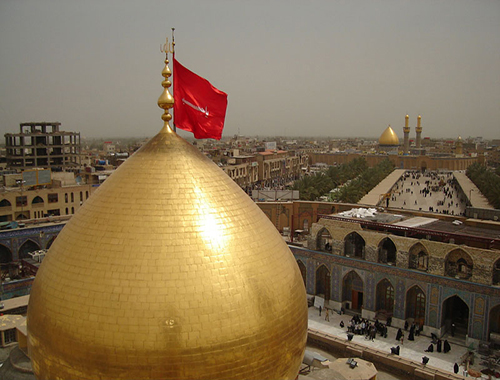4. FÄtima’s Status in the Qur’Än & the Sunnah
- Details
- Hits: 2236
4. FÄtima’s Status in the Qur’Än & the Sunnah
Our Lady FÄtimatu ‘z-ZahrÄ’ (a.s.) stands on the highest pedestal of spiritual ranks. She is an integral part of many verses in the Qur’Än. The most important of those verses are the following:
The verse of purity: This is the verse in which Allah says: “Verily Allah intends to keep off from you, O Ahlu ‘l-bayt, all kinds of abomination, and to purify you (spiritually) a thorough purification.” (33:33) In spite of all the differences among the Muslims about those on whom this verse can be applied, no one has ever disputed the fact that FÄtimatu ‘z-ZahrÄ’ is part of it. She has been kept away from all abomination and impurities, thus rendering her an infallible and sinless person by the will of Allah, subhanahu wa ta’ala.
FÄtimatu ‘z-ZahrÄ, ‘AlÄ«, Hasan, Husayn and, their servant, Fizza, fasted for three days. At sunset on the first day, a beggar came to the door; next day, an orphan came to the door; and on the third day, a captive came to the door all asking for food. On all three days ‘AlÄ« gave away his food —which consisted of one loaf of bread only— and others also followed his example even though they had nothing left for themselves. Allah was so much pleased with the selflessness and sincerity of FÄtima and her family that He revealed Chapter 76 of the Qur’Än highly praising them. “And they give away food, out of love for Him, to the poor, the orphan and the captive; saying ‘We feed you only for God’s sake, we do not expect from you any recompense nor gratitude!’” (76:8-9) After describing their reward in the paradise, Allah says: “Verily, this is unto you a recompense, and your endeavour is appreciated.” (76:22)
This verse, in reality, is Allah’s good tiding that FÄtima and her family will surely have an honourable place in Paradise.
In the ninth year of the hijrah when the Christian scholars and leaders from Yemen came to see the Prophet, they refused to agree with his logical arguments against Jesus being the “Son of God”. Then Allah ordered (3:54) the Prophet to challenge the Christians for malediction[39] and to bring themselves, their women and their children as partners in this event.
The Prophet of Islam, on his side, took ‘AlÄ« (as representing “yourselves”), Hasan and Husayn (as representing “your children”), and FÄtimatu ‘z-ZahrÄ’ (as representing “your women”). Not that there were no other women in Medina; no, there were many: his wives, relatives and women of his companions. But he just selected FÄtimatu ‘z-ZahrÄ’ because she alone was sufficient to stand by the Messenger of Allah in praying against the Christians.
* * *
There are many sayings from the Prophet about FÄtimatu ‘z-ZahrÄ. For instance, he said, “The best women of Paradise are Khadija bint Khuwaylid, FÄtima bint Muhammad, Maryam bint ‘ImrÄn and Ä€siya bint MuzÄhim the wife of Fir’awn.” (al-HÄkim in Mustadrak ‘ala ‘s-Sahihayn.) ‘Ä€isha, the wife of the Prophet, narrates another hadith that once the Prophet welcomed FÄtima and told her a secret which she disclosed only after the Prophet’s death. In that statement, the Prophet said to FÄtima: “...Do not you like to be the mistress of all the ladies of Paradise or the mistress of all the lady believers?” (al-Bukhari in his SahÄ«h.) There a third very famous saying of the Prophet about FÄtima which has also been quoted by al-Bukhari in his Sahih: “Verily FÄtima is a part of me; whosoever makes her angry, makes me angry.”
These remarks cannot be seen just in the context of “father-daughter” relationship; it throws light on the spiritual status of FÄtima. After all, the Prophet “does not talk from his own accord; [whatever he says is] nothing except a revelation which is revealed to him.” (53:3-4)











